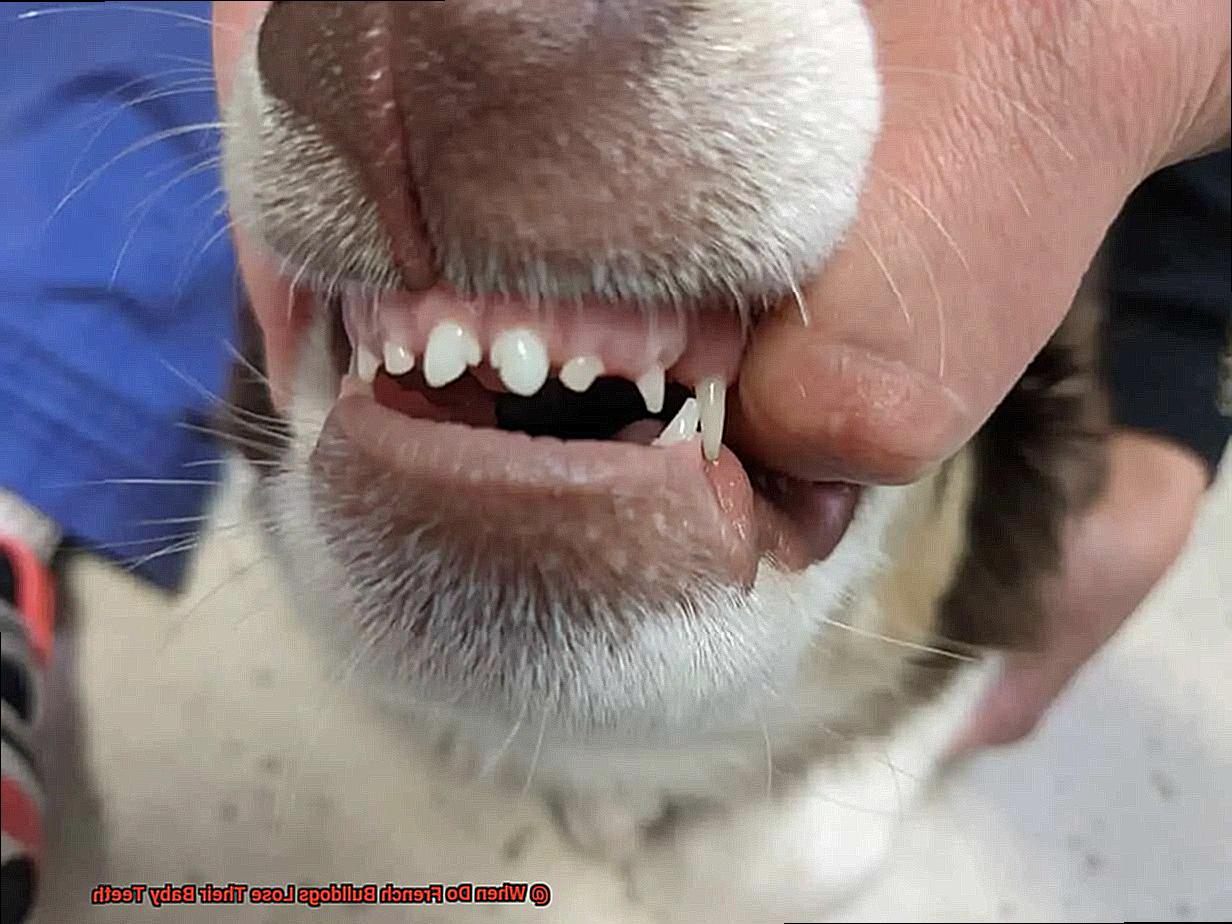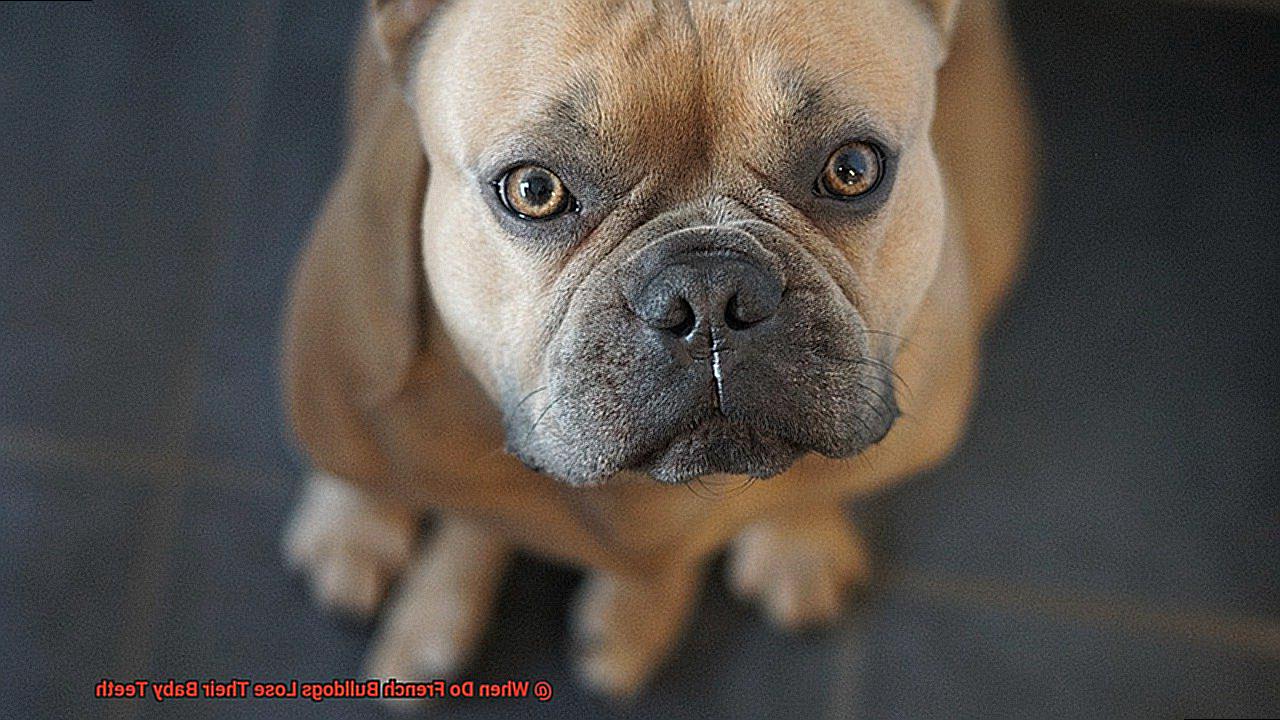When Do French Bulldogs Lose Their Baby Teeth?
Welcome to our ultimate guide on when French Bulldogs lose their baby teeth.
Puppies are undeniably adorable, with their fluffy fur and playful personalities. However, owning a puppy comes with its own set of challenges, including the dreaded teething phase.
French Bulldogs are a beloved breed that’s known for being charming, loyal, and affectionate. As an owner, it’s crucial to keep an eye on your furry friend’s health and behavior during this critical stage of their development.
In this comprehensive guide, we’ll delve into when French Bulldogs lose their baby teeth, the telltale signs that your pup is teething, and how you can support them through this process.
Watching your furry friend grow from a tiny ball of fluff to a full-grown dog is an exciting journey – and understanding their teething process is a crucial part of that journey.
With our expert guidance, you’ll be able to help your pup navigate this challenging time and emerge as a happy and healthy adult dog.
What is Teething?
Contents
That’s why it’s important to understand what teething is and how you can support your pup during this process.
Teething is a natural and necessary process for all puppies as they grow their adult teeth. It involves the shedding of baby teeth and the emergence of new ones in their place.
For French Bulldogs, this process typically starts around three to four months of age and can continue until they are around six months old. During teething, your Frenchie may experience discomfort, pain, and irritability due to their teeth pushing through their gums.
You may notice them drooling excessively or chewing on objects more often than usual. They may also feel irritable, lose their appetite or have swollen or bleeding gums.
A slight fever is also common during this time. Luckily, there are several things you can do to help ease your French Bulldog’s discomfort during teething.
Providing appropriate chew toys or frozen treats can help soothe sore gums and provide a distraction from the pain. Gently massaging your pup’s gums with a clean finger or damp cloth can also alleviate some of the discomfort.
It’s essential to note that during teething, it is normal for puppies to lose their baby teeth. This should not be a cause for concern as new teeth will eventually replace them.
However, if you notice any excessive bleeding or your Frenchie seems to be in significant pain, consult with your veterinarian immediately. Your vet can provide guidance on how to manage pain and ensure that no underlying issues are present.
In summary, teething is a natural process that French Bulldogs go through as they develop their adult teeth. Although it can be an uncomfortable and painful time for puppies, there are several ways to ease their discomfort and provide them with the necessary care and support.
By staying aware of the signs of teething and taking appropriate measures to help your Frenchie through this period, you can ensure that they grow up healthy and strong.
When Do French Bulldogs Begin to Lose Their Baby Teeth?

French Bulldogs typically begin to lose their baby teeth around 12-16 weeks of age.
This process, known as teething, can last until the puppy is between 4-6 months old. During this time, your Frenchie’s adult teeth will start to grow in and the baby teeth will fall out to make room for them.
It’s important to note that not all puppies lose their baby teeth at the same time. Some may lose them earlier or later than others, just like with human children.
Additionally, it’s common for puppies to experience discomfort or pain during the teething process, which can lead to behavior changes such as chewing on objects or refusing to eat. Don’t worry though, there are plenty of things you can do to help your Frenchie through this stage of their life.
Providing them with appropriate chew toys and monitoring them closely to ensure they aren’t chewing on anything dangerous or harmful is crucial. You can also try freezing some of their toys or treats to provide some relief for their sore gums.
Regular dental check-ups with your veterinarian are also essential during this time to ensure your Frenchie’s teeth are healthy and growing properly. Your vet can also recommend specific products or techniques to help ease your pup’s discomfort.
Signs of Teething in French Bulldogs
One of the less glamorous milestones that your furry friend will encounter is teething.
Teething is a natural process that all French Bulldogs go through as they transition from puppyhood to adulthood. While it may sound like a simple process, there are several signs to look out for and ways to help alleviate discomfort during this time.
One of the most common signs of teething in French Bulldogs is excessive drooling. Your pup may leave puddles of saliva everywhere they go, so be sure to have some towels handy.
Another sign is chewing on anything they can get their paws on. From shoes to furniture, your Frenchie may chew on anything they can find to relieve the discomfort caused by incoming teeth.
Swollen gums, loss of appetite, and sometimes even diarrhea are also common signs that your pup is teething. It’s important to note that while teething is a natural process, it’s crucial to monitor your Frenchie during this time to ensure they aren’t experiencing any severe pain or other health issues.

If you notice any bleeding or infection, it’s best to consult with your veterinarian for proper diagnosis and treatment. To help alleviate some of the discomfort during teething, provide your Frenchie with appropriate chew toys.
These toys can help satisfy their urge to chew while also promoting healthy teeth and gums. Remember to avoid giving them any hard toys that could potentially damage their teeth or cause choking hazards.
In addition to chew toys, you can offer cold or frozen items such as carrots or ice cubes wrapped in a cloth for your Frenchie to chew on. The coldness can provide temporary relief for their sore gums.

Overall, while teething may be a challenging time for both you and your Frenchie, it’s essential to monitor their symptoms and provide appropriate support and care during this time.
With the right tools and resources, you can help your furry friend navigate this milestone smoothly.
How to Help Your Frenchie Through the Teething Process
And during the teething process, it’s no different. Your Frenchie may experience discomfort and pain, but there are many ways you can help them through this challenging stage.
Appropriate Chew Toys
When it comes to teething, chew toys are your Frenchie’s best friend. But not all toys are created equal. Make sure to choose toys that are specifically designed for teething puppies. These toys can help soothe your Frenchie’s gums and alleviate discomfort, while also preventing damage to their teeth and gums.
Frozen Chew Toys
Frozen chew toys can provide extra relief during the teething process. Try freezing a wet washcloth, rubber toy, or even a carrot and give it to your Frenchie to chew on. The cold temperature can help numb the pain and soothe their gums, making them feel more comfortable.
Soft Foods
Hard foods can make chewing painful for French Bulldogs during the teething process. Instead, opt for soft foods or wet food that is easier for them to eat. You can also soak their kibble in water or chicken broth to make it softer, making mealtime more enjoyable for your furry friend.
Extra Attention

French Bulldogs may become more irritable or restless during the teething process, which is why providing them with extra attention and comfort is essential. Spend more time playing with them or simply cuddle with them on the couch. This can help distract them from any discomfort they may be feeling and provide them with a sense of security.
Dental Hygiene
During teething, French Bulldogs are more prone to dental problems such as gingivitis or tooth decay. Therefore, maintaining good dental hygiene is crucial by brushing their teeth regularly or providing them with dental chews. This will ensure that their teeth remain healthy and strong throughout the teething process.
Remember that all puppies lose their teeth at different rates, so it’s essential to monitor your Frenchie’s behavior and consult with a veterinarian if you have any concerns. By following these tips, you can help your Frenchie through the teething process and ensure that they remain healthy and happy throughout this challenging time.
When Do French Bulldogs Stop Teething?
On average, these adorable pups will finish teething by around 6 months old. However, every Frenchie is unique and may take longer or shorter to complete the process.
As your pup’s adult teeth come in, you may notice changes in their behavior, such as less interest in chewing on everything in sight and more enjoyment in playing with toys or simply cuddling with you.
During the teething period, it’s crucial to provide your Frenchie with appropriate chew toys to satisfy their urge to gnaw.
Frozen treats and soft foods can also help soothe their sore gums. Additionally, keeping up with good dental hygiene practices can prevent any potential issues from developing.
But how do you know if your Frenchie is experiencing any problems during teething? Be sure to monitor their teeth and gums for any signs of inflammation or bleeding.
If you notice anything unusual, seek veterinary attention promptly to avoid any complications. Remember that every Frenchie is unique, so be patient with your pup during this process.
EhLMgJtvZH8″ >
Conclusion
In conclusion, teething is a natural process that French Bulldogs experience as they transition into adulthood.
Typically starting between three to four months of age and lasting until around six months old, this can be an uncomfortable time for your furry friend. As a responsible owner, it’s crucial to monitor their behavior and health during this critical stage of development.
During teething, your Frenchie may experience discomfort, pain, irritability, swollen or bleeding gums, loss of appetite or slight fever. However, there are several ways you can help alleviate their discomfort.
Providing appropriate chew toys or frozen treats can soothe sore gums and distract them from the pain. It’s important to remember that during teething, it’s normal for puppies to lose their baby teeth.
This should not cause concern as new teeth will eventually replace them. However, if you notice excessive bleeding or significant pain in your Frenchie, consult with your veterinarian immediately.
By staying aware of the signs of teething and taking appropriate measures to help your Frenchie through this period, you can ensure that they grow up healthy and strong.
With the right tools such as soft foods or frozen treats and dental hygiene practices like brushing their teeth regularly, you can make the process more comfortable for them.




